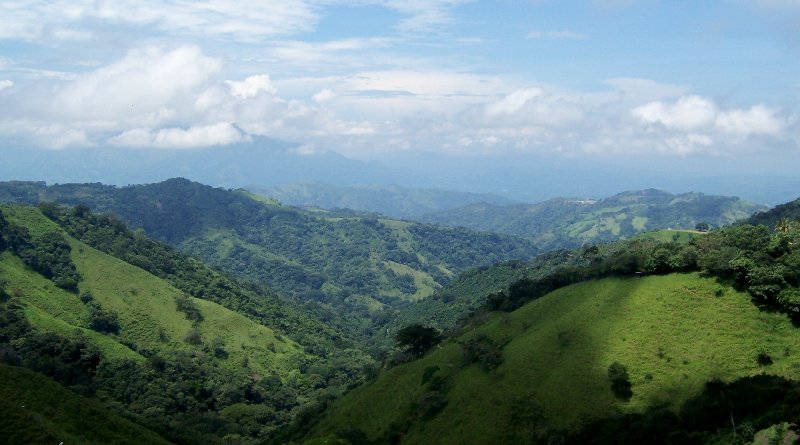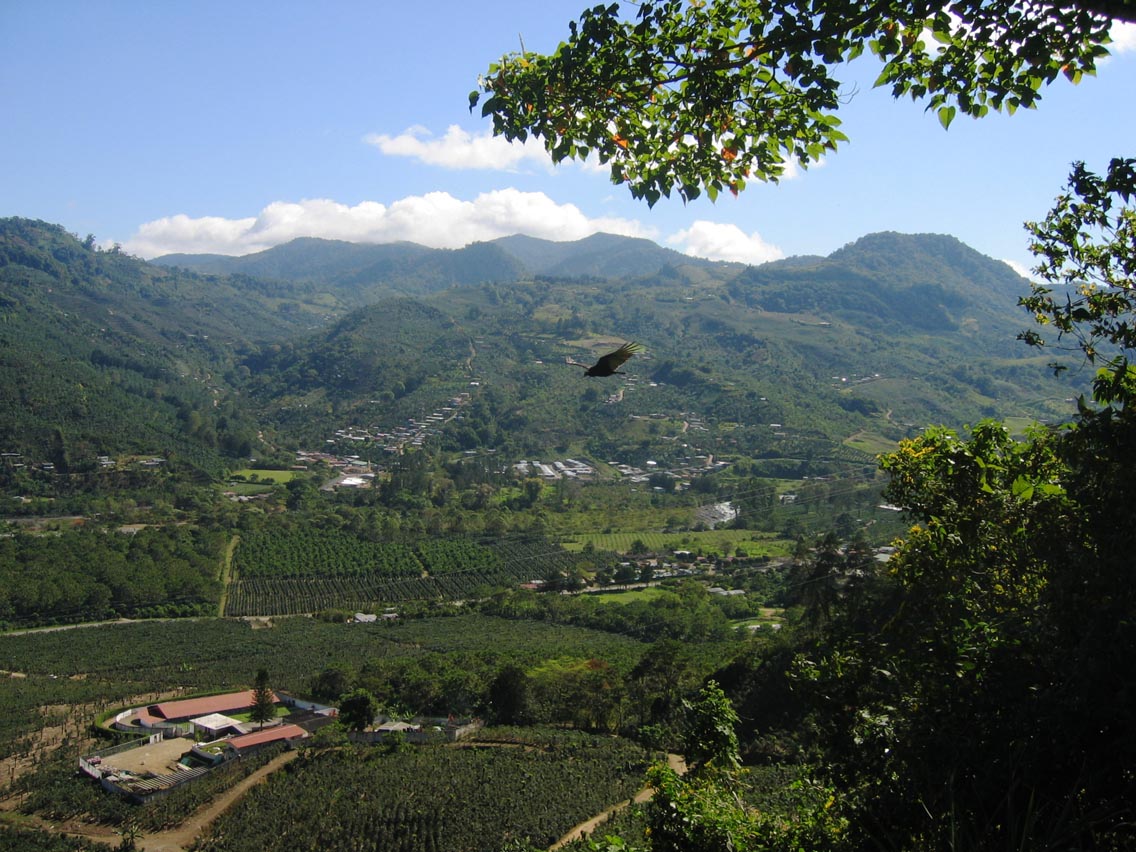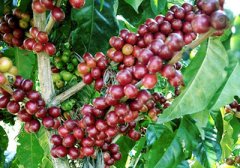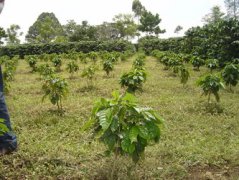Introduction to Costa Rica Coffee Manor in Costa Rica-Tarrazu three Wonders Manor in Tarazu

For professional baristas, please follow the coffee workshop (Wechat official account cafe_style)
Costa Rican coffee plantations with fertile volcanic ash, mild and suitable temperatures, and stable and abundant rainfall are one of the reasons why coffee has become one of the main agricultural products in Costa Rica. Its coffee beans are all Arabica species. The flavor is pure, the aroma is pleasant, and it has an impeccable balance in acidity and taste.
The coffee beans produced at the high latitudes of Costa Rica are famous in the world, full-bodied, mild in taste, but extremely sour. The coffee beans here have been carefully processed, which is why they have high quality coffee. Located in the south of SanJos é, the capital of Tarasu, Costa Rica is one of the most valued coffee growers in the country. Tarasu (Tarrazu) is one of the major coffee producers in the world.
Coffee was introduced into Costa Rica from Cuba in 1729. Today, its coffee industry is one of the well-organized industries in the world, with a yield of 1700 kg per hectare. Costa Rica has only 3.5 million people but 400m coffee trees, and coffee exports account for 25 per cent of the country's total exports. Costa Rica's volcanic soil is very fertile and well drained, especially in the central plateau CentralPlateau, where the soil consists of successive layers of ash and dust. Costa Rican coffee has full particles, ideal acidity and unique strong flavor.

Three Wonders Manor Costa Rica Finca Tres Milagros in Costa Rica
In the boutique coffee circle, as long as it is mentioned that Camilo, the owner of the San Tuareo estate, most people agree that because of his unusual enthusiasm for coffee cultivation and innovative experimental spirit, he has become the object of many top Barista cooperation in the world over the years. In 2013, the Facusse family, which has long run Dinant Food Sale in Costa Rica, decided to take advantage of Camilo's successful experience in planting estates in Colombia to start a new manor project in Costa Rica and named it the three Wonders. The name of the three miracles comes from Camilo's belief that all successful manors absolutely have these three factors to cooperate and cooperate with each other. These three elements are coffee trees, farmers and land.
Location was the most important decisive factor in deciding to start the plan for the Costa Rican manor. after a long discussion and land evaluation process, it was finally decided to choose Tarrazu, the highest producing area in Costa Rica, where the estate is located at an altitude of 1450-1750 meters above sea level, and the soil is pozzolanic soil from the Irazu volcano, providing sufficient nutrients for coffee trees. At the same time, Camilo also requires the manor to maintain a low-density coffee planting area, which is more conducive to the absorption and growth of coffee trees, as well as a higher improvement of cup flavor. At present, the planting area of the three Wonders Manor is about 120ha, and the annual top micro-batch output is only about 300bags. In addition, the hardware of the manor is mainly planned according to four key points:
The first is to use the Green House system (Green House System) to provide better humidity, temperature and ventilation of raw coffee beans during the sun-drying phase.
The second is the environmental intercropping symbiosis system (Intercrop System), which not only provides manor ecological diversity by planting different plants, but also helps farmers to control farm ecology.
The third is shade tree planting (Shade Grown System). Most of the Inga trees are used in the manor with some other local trees, so that the growth of coffee trees is in a perfect shade environment to protect the growth of coffee trees.
The fourth is to choose the right coffee variety. At the beginning of planting on the manor, Camilo decided to adopt the traditional coffee variety with low yield but better flavor. In addition to Bourbon and Geisha, F1 is a new variety developed by the French research organization CIRAD in Costa Rica in recent years. F1 is a mixture of Villa Sarchi+Sachimor and Sudan Rume. In addition to the traditional Central American Villa Sarchi flavor, it also has the citrus flavor of the African variety Sudan Rume.
[3 free 2] Qianjie Costa Rica plus boutique coffee beans fresh roasted single product SOE100g small package

Purchase link: https://item.taobao.com/item.htm?spm=a1z10.3-c-s.w4002-15673140470.33.68714ea9TMnzDQ&id=565357721039
Important Notice :
前街咖啡 FrontStreet Coffee has moved to new addredd:
FrontStreet Coffee Address: 315,Donghua East Road,GuangZhou
Tel:020 38364473
- Prev

How do you make Costa Rican coffee? Costa Rican coffee bean grading standard tells you
For professional baristas, please follow the coffee workshop (Wechat official account cafe_style) Costa Rican coffee was introduced from Cuba in 1779. Almost all the high-quality coffee in Costa Rica comes from around the high-altitude San Jose Mountains. This large area is divided into four main producing areas, Tarrazu,Tres Rios,Heredia and Alajuela. It is necessary to cultivate high quality coffee.
- Next

An overview of Costa Rican coffee beans the relationship between the origin and quality of Costa Rican coffee
Communication of professional baristas Please pay attention to the coffee workshop (Wechat official account cafe_style) the coffee beans produced in the high latitudes of Costa Rica are famous in the world, full-bodied, mild in taste, but extremely sour, and the coffee beans here are carefully processed, which is why there is high quality coffee. Costa Rica is located in SanJos, the capital of the State of Tarasu.
Related
- Detailed explanation of Jadeite planting Land in Panamanian Jadeite Manor introduction to the grading system of Jadeite competitive bidding, Red bid, Green bid and Rose Summer
- Story of Coffee planting in Brenka region of Costa Rica Stonehenge Manor anaerobic heavy honey treatment of flavor mouth
- What's on the barrel of Blue Mountain Coffee beans?
- Can American coffee also pull flowers? How to use hot American style to pull out a good-looking pattern?
- Can you make a cold extract with coffee beans? What is the right proportion for cold-extracted coffee formula?
- Indonesian PWN Gold Mandrine Coffee Origin Features Flavor How to Chong? Mandolin coffee is American.
- A brief introduction to the flavor characteristics of Brazilian yellow bourbon coffee beans
- What is the effect of different water quality on the flavor of cold-extracted coffee? What kind of water is best for brewing coffee?
- Why do you think of Rose Summer whenever you mention Panamanian coffee?
- Introduction to the characteristics of authentic blue mountain coffee bean producing areas? What is the CIB Coffee Authority in Jamaica?

